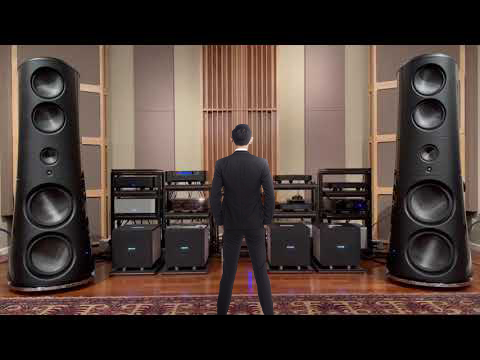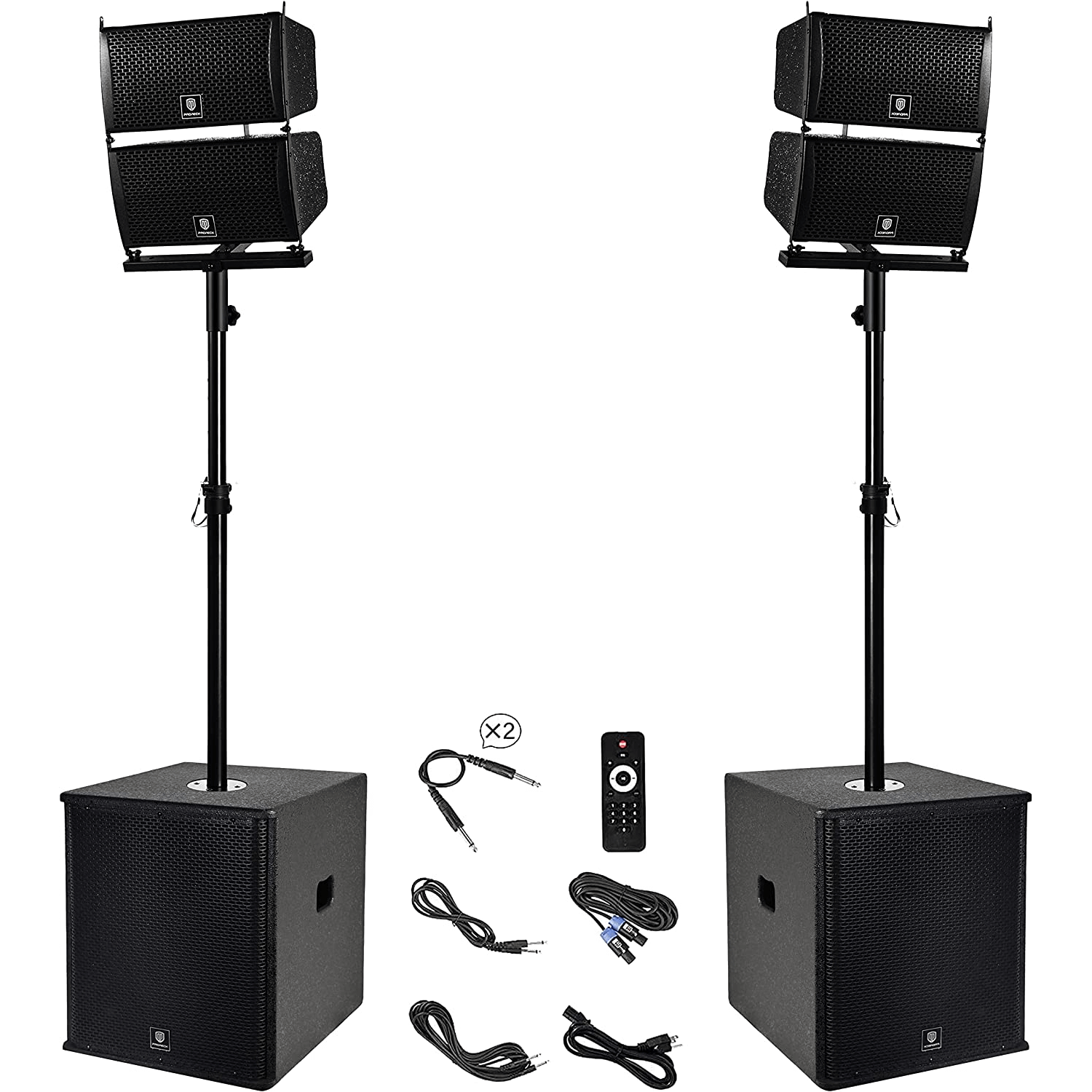Introduction
You've splashed the cash on a decent sound system, but something's missing, right? That chest-thumping, trouser-flapping bass that truly brings your music to life. That's where the mighty subwoofer comes in. But before you go sticking the biggest, baddest subwoofer in your boot, there's a crucial question to answer: what size subwoofer is best for sound quality?

1. What is a subwoofer?
Let's start with the basics. A subwoofer is essentially the Hulk of your sound system. It's a specialized loudspeaker designed to reproduce low-pitched audio frequencies, typically from 20 to 200 Hz. These are the sounds that make your chest thump during a car chase scene in an action movie or the deep bass lines that give music its full-bodied presence. In essence, subwoofers bring the oomph to your audio experience.
2. Three Common Sizes of subwoofer
Subwoofers come in a range of sizes, each with its own strengths and weaknesses. Here's a quick rundown of the most common sizes:

12 inch subwoofer
This pint-sized sub might not win any loudness contests, but it has its merits. They're compact and easy to install, perfect for those who lack boot space or crave a more subtle bass boost. However, don't expect earth-shattering tremors – these guys are better suited for adding a touch of warmth to your soundstage rather than bone-crushing basslines.
|
Feature |
Pros |
Cons |
|
Size |
Compact, easy to install in tight spaces |
Limited mounting options |
|
Weight |
Lighter, easier to move |
Not be as secure in some installations |
|
Price |
More affordable |
Lower overall bass output |
|
Sound Enhancement |
Adds warmth and depth |
May not be suitable for all music genres |
|
Power Requirements |
Works well with lower-powered amplifiers |
Require a specific enclosure |
If you prefer a subwoofer of this size but seek better sound, our Dual 12inch Subs will fulfill your fantasies.
15 inch subwoofer
Now, moving up to the 15-inch subwoofer – think of it as a well-balanced athlete. It's versatile, offering a good mix of punch and depth. It's not too large to be cumbersome, yet it's substantial enough to handle a wide range of music genres and movie soundtracks. The 15-inch sub strikes a fine balance, making it a popular choice for both car audio systems and home theaters.
|
Feature |
Pros |
Cons |
|
Size |
Good balance between size and power |
May require some trunk space |
|
Weight |
Manageable weight for most installations |
Heavier than 12-inch subwoofers |
|
Price |
Generally affordable |
More expensive than 12-inch subwoofers |
|
Sound |
Delivers tighter, more responsive bass |
May not reach the deep bass of larger subwoofers |
|
Versatility |
Works well with most music genres |
Might not be ideal for extreme bass enthusiasts |
|
Power |
Can handle moderate power levels |
May require a more powerful amplifier for peak performance |

18 inch subwoofer
Finally, we have the dual 18-inch subwoofer. This size is for those who believe that bigger is indeed better. A 18-inch subwoofer can produce bass that not only fills the room but can rattle the windows. It's an over-the-top option, suited for large venues or for those who want to turn their living room into a concert hall. They're terrific for car audio competitions, but for everyday listening, they may be impractical and overpowering.
|
Feature |
Pros |
Cons |
|
Size |
Produces incredibly deep, earth-shaking bass |
Requires enormous trunk space (may not fit in all vehicles) |
|
Price |
Most expensive subwoofer size |
Often requires a very powerful amplifier (significant additional cost) |
|
Sound |
Ideal for car audio competitions or extreme bass lovers |
Can overpower other speakers and distort sound at high volumes |
|
Power Consumption |
Draws significant power from the electrical system |
May require an upgraded electrical system to handle the load |
|
Installation |
Almost always requires a custom enclosure for proper performance |
Pre-built enclosures are unlikely to accommodate the size and power |
You may have focused only on size, but definitely don't overlook the importance of quantity. That's why dual 18 inch subs is the most important option we want you to consider before making a decision.
3. How to Choose Between a 12", 15", and 18" Subwoofer: Which size of subwoofer sounds the best?
The answer, depends on your specific needs and preferences. Choose a 12-inch subwoofer for portability and tight bass, a 15-inch for balanced depth and power, or an 18-inch when you need massive low-end and high SPL performance.
✅ 12 Inch Subwoofer: Compact, Tight, and Precise
A 12 inch subwoofer is ideal for smaller setups or users with limited space. It delivers punchy, fast bass that’s perfect for tight mixes, indoor gigs, or portable PA systems. If you're a mobile DJ, working in small venues, or just need a subwoofer that’s easier to carry and install, a 12” sub hits the sweet spot between clarity and convenience.
Best for: Small indoor events, mobile DJs, home use, fast response audio like hip-hop, pop, or acoustic sets.
✅ 15 Inch Subwoofer: Balanced Power and Versatility
The 15 inch subwoofer strikes a balance between output and portability. It offers stronger low-end response than a 12" while still being manageable in terms of weight and size. A great all-around performer, it's well-suited for medium-sized venues, weddings, and general-purpose PA systems.
Best for: DJs, event hosts, or bands who want a versatile subwoofer that can handle everything from live music to recorded playback.
✅ 18 Inch Subwoofer: Deep, Room-Shaking Bass
If you’re looking to shake the dance floor or fill a large venue with rich, chest-thumping bass, the 18 inch subwoofer is your go-to. These are designed for maximum output and deep frequency extension, making them a staple in concert setups, outdoor events, and club systems. While they are heavier and bulkier, their performance in bass-heavy genres like EDM, reggae, and trap is unmatched.
Best for: Large crowds, outdoor gigs, live concerts, and bass lovers who want that earth-moving low-end punch.
Final Thoughts - What Size Is Right for You?
-
Go 12inch sub if you need portability and sharp bass.
-
Choose 15 inch sub for a mix of depth, power, and flexibility.
-
Pick 18in subwoofer when only massive bass and high SPL will do.
4. The best 4 Subwoofer brands in 2024

SVS Subwoofer
SVS is the Ferrari of subwoofers – high-performance and highly revered. Known for their impeccable build quality and groundbreaking technology, SVS subwoofers deliver exceptional sound quality across the board.
Proreck
Proreck may not be as famous as SVS, but it's the underdog with a punch. Offering budget-friendly yet powerful subwoofers. Proreck is a favorite among those who want great performance without breaking the bank. Its subwoofer series is a prime example of how affordable doesn’t mean compromising on sound quality.
Klipsch
Klipsch is a name that resonates with both audiophiles and casual listeners alike. Renowned for their dynamic sound and robust construction, Klipsch subwoofers like the R-120SW provide deep, impactful bass that's perfect for home theaters. Their design philosophy is simple: deliver high output with minimal distortion.
Rockville
Rockville Audio is a company that specializes in audio equipment, including car audio, home audio, pro audio, and marine audio products. They offer a wide range of products such as rockville pa speakers, subwoofers, and so on. They have been in this market for many years as an old brand, but their price is not competitive enough now.
5. Conclusion
In the end, the best subwoofer size boils down to your individual needs and preferences. Whether you want tight, punchy bass or window-rattling depth, there's a subwoofer out there for you. And with top-notch brands like SVS, Proreck, and Klipsch leading the charge, you're sure to find the perfect match. Still don't know what to do? Contact our experts for more information.







